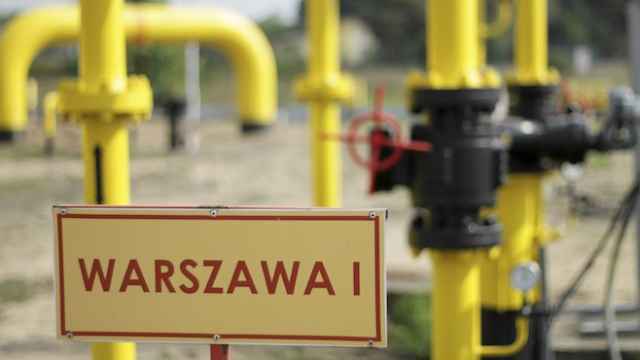Western sanctions on Russia over Ukraine are likely to delay the launch of new oil pipelines in Siberia, Russian oil pipeline monopoly Transneft said Tuesday, potentially derailing plans to boost oil exports to Asia in coming years.
But some industry sources said the delay has long been on the cards due to the revision of fields' reserves estimates and is not directly connected to the sanctions.
The United States and European Union have imposed sanctions against Russian oil companies over Moscow's role in the Ukrainian conflict which has claimed more than 3,000 lives.
A spokesman for the company said the sanctions could delay plans to launch the Zapolyarye-Purpe and Kuyumba-Taishet pipelines by two to three years.
He added that some companies failed to submit their plans for oil supplies via the pipelines by Sept. 15, as had been ordered by Russian Deputy Prime Minister Arkady Dvorkovich.
"The situation with sanctions is being studied by our partners. Force majeure is connected to the sanctions. The schedules of the fields' launch will be delayed," Igor Dyomin told reporters.
Industry sources said that the companies have long planned to delay development of the fields, long before the sanctions were implemented.
"The oil companies had changed output plans before the sanctions. Everyone saw that the fields' reserves were overestimated," one source said, declining to be named because he was not permitted to speak to the press.
Rosneft, the world's largest listed oil company by output, is preparing to boost oil exports to China to almost 1 million barrels per day by the end of this decade, seeking to secure market share and billions of dollars in pre-payments.
The 488 kilometer Zapolyarye-Purpe links northern fields in the Yamal-Nenets region with Western Siberia, its nameplate capacity set at 45 million tons a year, or 900,000 barrels per day. SeverEnergia, LUKoil, Gazprom and Rosneft planned to supply its oil via the pipeline.
Kuyumba-Taishet is designed to pump oil from Yurubcheno-Tokhomskoye field and Kuyumba deposit in East Siberia to the East Siberia-Pacific Ocean trunk. Its capacity is seen at 15 million tons a year, and it is essential for Russia to honor its increasing oil deals with Asian buyers.
Both pipelines were due to launch at the end of 2016.
Yurubcheno-Tokhomskoye, operated by Rosneft, is due to start production in 2016, with peak production originally envisaged at 200,000 bpd.
Kuyumbinskoe, a joint venture between Rosneft and Gazprom Neft, is due to come on stream in 2017 with production of 6,000 bpd, rising to 217,000 bpd in 2029.
Transneft's Dyomin said that China has confirmed its readiness to receive 20 million tons of oil, or 400,000 barrels per day, next year, up from an expected 15.6 million tons this year.
A Message from The Moscow Times:
Dear readers,
We are facing unprecedented challenges. Russia's Prosecutor General's Office has designated The Moscow Times as an "undesirable" organization, criminalizing our work and putting our staff at risk of prosecution. This follows our earlier unjust labeling as a "foreign agent."
These actions are direct attempts to silence independent journalism in Russia. The authorities claim our work "discredits the decisions of the Russian leadership." We see things differently: we strive to provide accurate, unbiased reporting on Russia.
We, the journalists of The Moscow Times, refuse to be silenced. But to continue our work, we need your help.
Your support, no matter how small, makes a world of difference. If you can, please support us monthly starting from just $2. It's quick to set up, and every contribution makes a significant impact.
By supporting The Moscow Times, you're defending open, independent journalism in the face of repression. Thank you for standing with us.
Remind me later.





